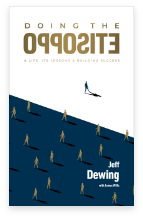Blog

You might be wondering how the CEO of a facilities management company crossed paths with a fighter pilot?
Recently, I was privileged to meet Mandy Hickson, one of Britain’s first female pilots to serve on the front-line in Iraq. Mandy piloted a Tornado GR4, one of the world’s fastest and most successful combat jets in the RAF.
The jet has a maximum speed of 1.3 Mach, which to you and me, means when an aircraft flies at Mach 1, its speed is 717 miles per hour! And it will come as no surprise that the Tornado is not cheap – it comes with a price tag of between £21 and £21.6 m.

After learning this my immediate thoughts were that Mandy must be highly confident, astonishingly fearless, and an incredibly quick thinker.
So, how did I meet Mandy?
Well it came about when we invited Mandy to address our employees at our 500-strong conference; we wanted to inspire them to think independently and in an agile fashion – I believe these are key qualities of a highly effective person, and something that Mandy has the monopoly on, I would say.
And on stage, under the bright lights of the conference, Mandy delivered a vivid insight into the leadership, teamwork and communication required to define and then realise specific goals, in high pressure situations.
For anyone whose expectations of fast jet pilots are from movies such as Top Gun, Mandy is no disappointment. Mandy’s address was spell bounding and full of humour, and as a speaker, one I would thoroughly recommend. Mandy is one of those individuals worth seeking out. Like all combat pilots, she was trained to make decisions under circumstances at the very limit of what human beings can cope with and has successfully paved a career using her experience to advise leaders in the private and public sectors.
What she highlighted for us, were two key qualities – integrity and freedom – which happen to be two of Cloudfm’s values.
With integrity we speak truthfully and sincerely, we act with honesty and fairness and we take ownership for our actions, keeping to our word and are therefore trustworthy.
To have freedom is to challenge the status quo, try new things and to be our best self, and to give ourselves and each other, the freedom to learn and grow.
I wholly believe that by adopting these qualities not only do we become more efficient, but we work even better as a team and business.
Going back to Mandy, she had a clear affection for the aircraft she flew, but what of the two people inside it?

In the most high-pressure scenarios, combat pilots rely on some of the most rigorous training. Mandy was unequivocal on the value of this but, perhaps surprisingly, she spoke of the balance between being conditioned to react effectively in a split second and being taught to question your actions and reactions over a matter of seconds, minutes and hours.
I truly believe that the ability to think independently and in an agile fashion is the one most relevant to the world of business.
‘Situational awareness’ is the aviation industry term for this, and one that Mandy spoke about with absolute enthusiasm. She spoke of the DODAR methodology (Diagnosis, Option, Decision, Action, Review) as a useful structure to support decision making in a dynamic environment. And it’s the last of those steps – to review – that helps ensure the quality of decision-making in business, increases over time.
“Even as junior officers, we were always taught to question how decisions had been made during a mission, and why individuals had done what they had,” Mandy explained at the conference. “And over my time in service, that resulted in huge improvements to the way we ran our organisation.”
Interestingly, Mandy had a slightly different way of thinking about how mistakes can be used as an opportunity for learning. For her, it is not about an absence of blame, but of ensuring responsibility and accountability. “A blame culture is unsafe, because then nobody speaks up about mistakes,” she told us, “but a no-blame culture is equally unsafe, because that says that no-one has responsibility for their actions.”
What an effective organisation does is understand that even the world’s best professionals are still human beings, and that they will make errors. They will look for short cuts and fall away from ideal behaviours over time, but so long as we make it part of everyone’s responsibility to share and analyse their mistakes, then together we can maintain and improve the systems that prevent catastrophe.
This is a theme that Mandy was passionate about: “For every one catastrophe, you’ll have on average 300 mistakes that have no ill effects – that’s 300 opportunities to strengthen the systems you have in place, and help everyone perform at their best. Those opportunities are exciting. When I make a mistake like that, I can’t wait to tell people about it, because it helps make everyone better at their jobs.”
This empowerment is key to the culture of effective decision making in the RAF. Not only are junior members of staff empowered to ask questions of their superiors’ decisions, but they are empowered to make major decisions themselves, even in the most challenging circumstances. That’s something that should have resonance for any leader in business, who wishes to build better decision-making skills within their team.
That’s a long way from how most businesses operate, but it’s clear that the benefits of doing so are huge. Nurturing leadership and decision-making skills throughout the hierarchy is a goal for almost all high-performing businesses. And that is one lesson from the world of military aviation that it is possible for leaders in any organisation to adopt.

